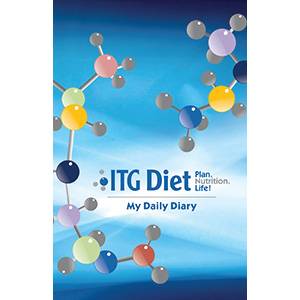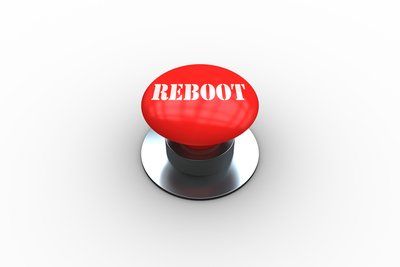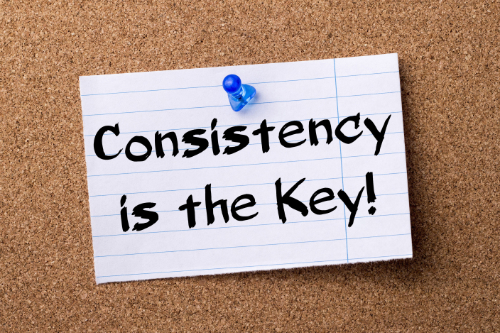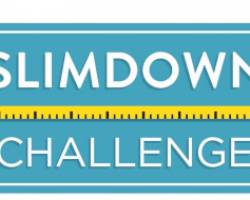ITG Diet Blog
The ITG Diet blog delivers informative weight loss tips, health resources and nutritional information to help you along your weight loss journey.
Using the Daily Food Diary
- Font size: Larger Smaller
- Hits: 2486
- 0 Comments

One of the most important tools your Coach will use each week, whether you are working with them in person or online, is the Daily Food Diary. In order to see continued results and be able to make adjustments, make sure you are filling out your Diary completely.
In your initial consultation and throughout the course of the program, your Coach will discuss these important parts of the Daily Food Diary (online and paper):
Protein: Your required ITG protein foods for the day should be filled out, along with your cooked dinner protein and any additional proteins you might be advised to eat (hard boiled eggs, 3 ounces of meat on the Plus Pro version, or extra proteins in the first couple weeks of the program to help with hunger issues). It's important to remember that no proteins are optional - the "ITG Snack" is not extra, it is your 4th protein of the day and required on Step 1. Always make sure to get in the correct amount of protein that your Coach discusses with you, as you can begin to lose muscle mass if not eating enough.
Beverages: It might not seem that important, but anything other than water should also be recorded. Diet sodas and teas can contain sodium and caffeine which can affect body water. Using water enhancers may also affect weight loss since they contain artificial sweeteners. Alcohol contains 7 calories per gram, so alcoholic beverages should also be recorded if used. Your Coach may require you to record how many ounces of water each day so that hydration levels may be monitored and water intake can be increased throughout the duration of the program.
Vegetables: It's important to get in all 4 cups of vegetables each day. Your Coach will use this information to determine if you are mixing up your vegetables, and not eating too many high carb vegetables throughout the week. Record the number of cups (example - 1 cup broccoli, 1.5 cups cauliflower) at each meal. If you are spreading out your veggies throughout the day, you should also record snack vegetables as part of your 4 cups per day on a meal entry line or in the Notes section of the Diary.
Salad: Remember that salad is recommended, but not required. It is to be used for "crunch factor" so that through the act of chewing, your brain and your stomach will connect and realize that it is feeling full and satiated. ITG recommends to have a salad available at every meal. Keep in a sealable container and put dressing on the side so that if you aren't feeling hungry enough to eat it, you can seal it up and place in the refrigerator. If you have a snack craving later, enjoy some of that salad in between meals. Salad does not count as vegetables for the day, and ITG also recommends not to use too much spinach or kale toward your 4 cups. Don't forget to record what you are using for dressing.
Supplements: Record your daily supplement intake in your diary. Required supplements on the program are the ITG Multivitamin, Calcium/Magnesium, and Omega (available in bottles or PowerPacks.) You should also record any additional supplements you are taking. For any changes in medications prescribed by your doctor, make sure to keep your Coach notified. If you doctor has prescribed any of the required supplements to you already, please discuss with your Coach to make sure you are getting enough nutrients while on the program, since we are being very restrictive in Steps 1 & 2.
Water: Use the checkboxes in your online diary. Remember that the minimum eight 8-ounce glasses per day is not enough water on a ketogenic diet, if you are active, for larger body mass, and in hot temperatures. Discuss with your Coach the recommended ounces of water to work toward each day. Every checkbox could signify a bottle of water or whatever you and your Coach discuss. You may also record how many ounces a day in the Notes section online or in your paper Diary.
Physical Activity: It would be beneficial to track your physical activity to determine if you are exercising too much. Remember, the ITG Diet Plan in Step 1 does not provide enough calories for intense workouts and can cause you to crash your metabolism. A good balance of exercise while on the program includes walking, biking, swimming, Body Basics exercises from ITG, or using light weights for toning. Low to Moderate Steady state exercise, which tends to burn stored body fat, is the best for weight loss in Step 1. Remember that you should not weigh on a body composition scale (BIA scale) within several hours after exercise because your fat free mass may be greatly overestimated (muscle tissue would be retaining more water weight after a workout) and fat underestimated.
Restroom issues: If you experience constipation or diarrhea, you may record this data in your diary. Your Coach can recommend a cleanse or ITG Colon Lax if you are unable to use the restroom regularly. If you have been constipated for several days and check your weight, you may be experiencing retention if the numbers are not going down week to week. For ongoing constipation issues, it would be beneficial to speak with your primary care physician. Constipation is a common side effect of a ketogenic diet, especially for women, so make sure to drink plenty of water and eat fiber-filled vegetables.
Record your success for the day: ITG Daily Food Diaries in paper and online both contain a section that asks how you felt you did that day. Green is perfect, yellow is did "okay" and red would signify eating off-program foods or not eating all required proteins/vegetables/drinking water.
Notes: Write down anything that helps your Coach understand your day. If you were stressed, or hungry between meals, write it down so that they can help you determine strategies to get through your next week, give you recipe ideas, or help you get in your foods a bit more easily by planning, prepping, and spreading things out throughout the day.
To read more about why the Food Diary is so important, read the ITG Article here.











